Is your child growing fast — but not eating enough protein? You’re not alone. Many Indian parents worry about whether their kids are getting enough nutrition, especially when following a vegetarian lifestyle. The truth is, a balanced protein rich veg diet plays a crucial role in your child’s growth and overall health. Protein is the building block of life — it helps develop muscles, strengthen bones, and build a strong immune system. Choosing the right high protein foods in vegetarian diet ensures that your child gets all the essential amino acids needed for energy, repair, and healthy development.
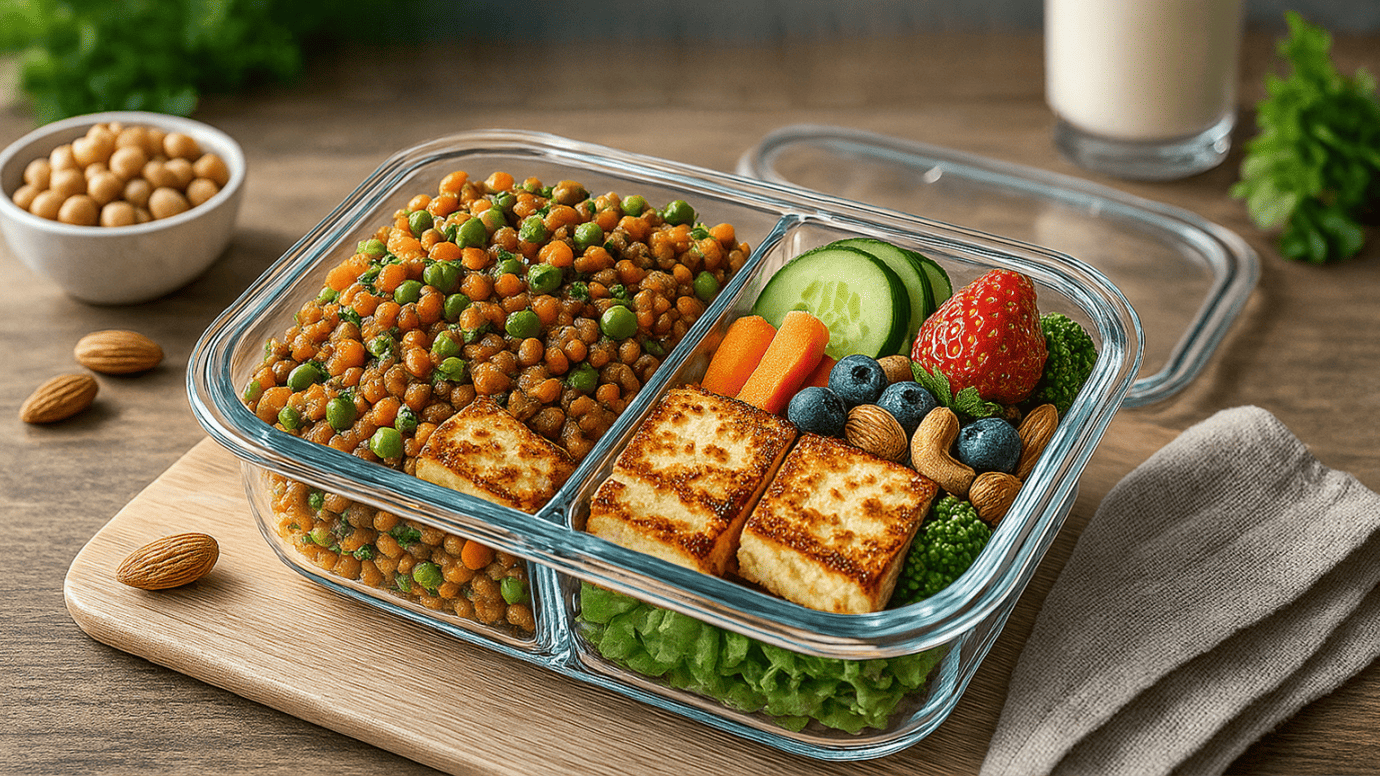
In India, where most families rely on plant-based meals, parents often ask, “If my child doesn’t eat eggs or meat, are they missing out on nutrients?” Absolutely not — with the right planning, even a 100% vegetarian meal plan can provide all the necessary protein. Ingredients like lentils, beans, paneer, curd, tofu, soy, and nuts are powerful sources of protein in Indian vegetarian diet that can easily meet your child’s daily protein needs.
With a tailored high protein vegetarian diet plan, your child can enjoy tasty, traditional Indian meals while building strength, stamina, and confidence — naturally and happily.
Understanding Protein Needs for Kids
Protein is one of the most important nutrients in a child’s diet — it supports muscle development, bone strength, and immune health, while helping repair cells and tissues. For parents following a vegetarian lifestyle, ensuring the right balance of nutrients through a protein rich veg diet is key to supporting a child’s rapid growth and active lifestyle.
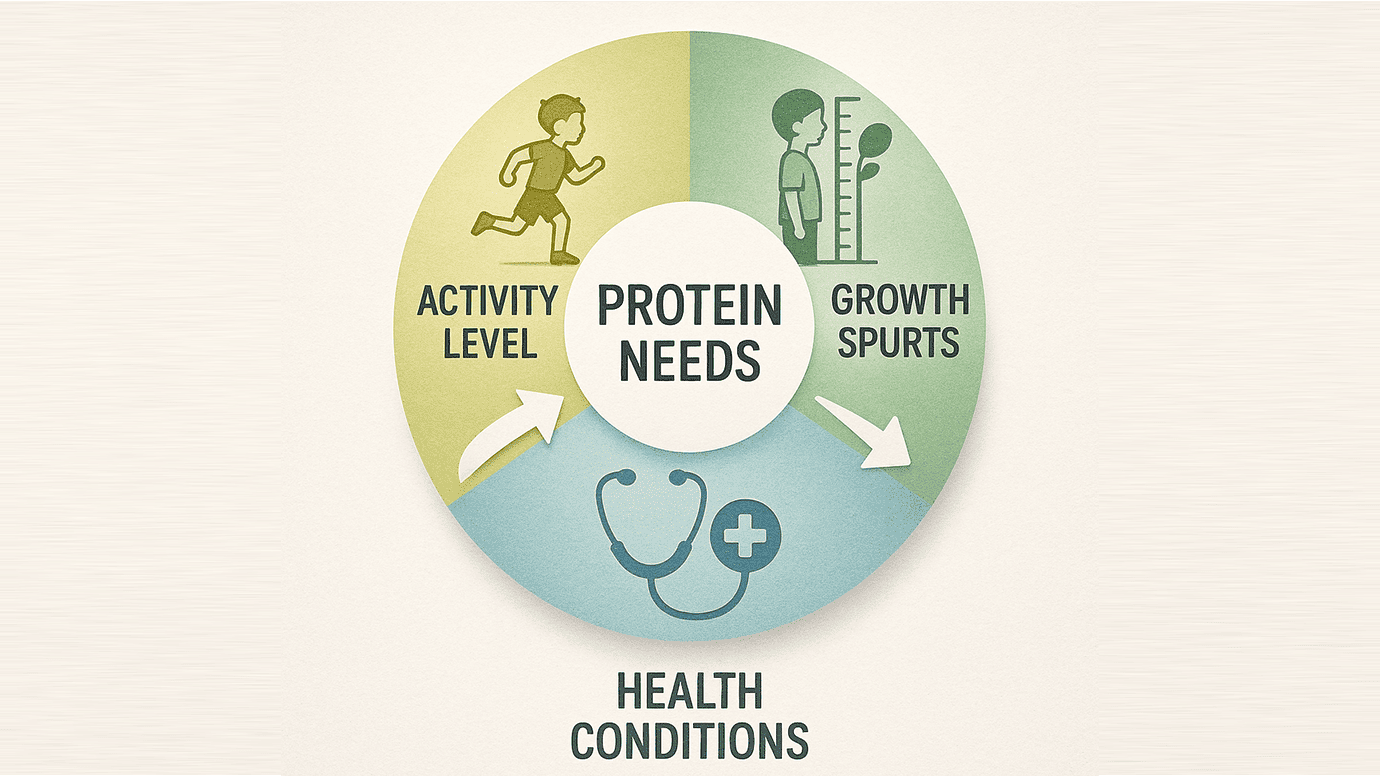
Including a variety of high protein foods in vegetarian diet helps your child stay energetic, focused, and resilient against infections.
Age-Wise Protein Requirements for Kids
Every child’s body requires different amounts of protein depending on age and growth rate. Here’s a general guideline:
Age Group | Daily Protein Requirement |
1–3 years | 13 g/day |
4–8 years | 19 g/day |
9–13 years | 34 g/day |
Note: These are approximate values. The actual protein requirement depends on your child’s height, weight, and activity level. Always consult a professional dietitian to understand your child’s exact needs and build a customized high protein vegetarian diet plan.
Factors That Affect Protein Needs
Several factors determine how much protein your child needs every day:
Activity level:
Active kids or those involved in sports require more protein foods for vegetarian diet.
Growth spurts:
Periods of rapid growth increase protein demand for tissue building.
Health conditions:
Recovery from illness or nutritional deficiencies may need additional protein support.
Choosing balanced sources of protein in Indian vegetarian diet, such as lentils, paneer, soy, nuts, and curd, ensures your child gets a complete amino acid profile.
Signs of Inadequate Protein Intake
A lack of protein can affect your child’s energy and growth. Common warning signs include:
- Slower growth or weight gain
- Fatigue and low stamina
- Brittle hair or nails
- Weak immunity and frequent illness
If you notice these symptoms, it might be time to review your child’s nutrition and incorporate a high protein vegetarian diet.
Challenges Parents Face to Complete Protein Intake for their Kids
Ensuring protein rich veg diet for kids can be tricky for many Indian parents. While vegetarian meals are healthy and diverse, they often miss the ideal balance of macronutrients — especially protein. Below are some common challenges parents face while trying to provide a protein rich veg diet for their children:
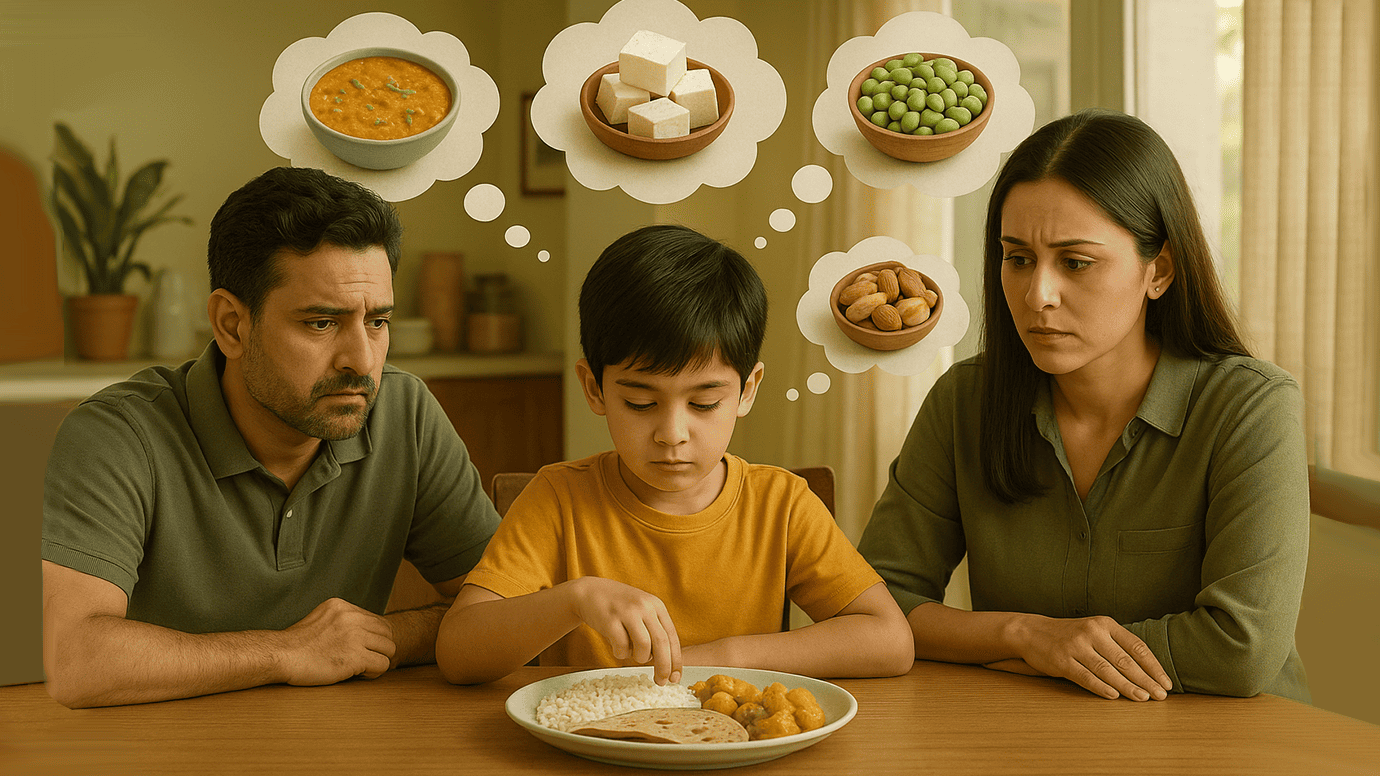
1. Carb-Heavy Meal Patterns
Most Indian households rely heavily on carbohydrate-rich foods such as roti, rice, and potatoes. While these foods provide energy, they lack sufficient protein. Over time, this imbalance can affect a child’s growth, stamina, and immunity. Including high protein foods in vegetarian diet is essential to make everyday meals more nutritious and complete.
2. Misconception: Protein Comes Only from Meat and Eggs
A widespread myth among vegetarian families is that adequate protein intake is only possible through non-vegetarian foods. In reality, there are several sources of protein in Indian vegetarian diet like lentils, pulses, soy, paneer, curd, tofu, and nuts. When planned wisely, these foods can easily form part of a high protein vegetarian diet suitable for all age groups.
3. Picky Eating Habits
Many children are selective eaters who often reject dal, lentils, and vegetables — which are core protein foods for vegetarian diet. The challenge lies in making protein-rich meals interesting. Parents need to introduce variety through recipes such as moong dal chilla, paneer wraps, or soy tikkis to make a protein rich veg diet more appealing.
4. Lack of Awareness About Complete vs. Incomplete Proteins
Another common problem is not understanding the difference between complete and incomplete proteins. Most plant-based foods are incomplete proteins, meaning they lack one or more essential amino acids. However, when combined smartly — like dal with rice or chapati with curd — they form complete proteins. This awareness is key to creating the best protein diet for vegetarians that meets a child’s full nutritional needs.
5. Limited Meal Planning Knowledge
Parents often struggle to structure a high protein vegetarian diet plan that fits daily routines, tastes, and nutritional goals. Without proper planning, protein intake remains inconsistent. A balanced meal plan with diverse high protein foods in vegetarian diet helps maintain steady growth, energy, and focus.
Despite these challenges, a high protein vegetarian diet can easily meet a growing child’s needs with the right combinations, creativity, and consistency. A thoughtful approach ensures that kids not only enjoy their meals but also get all the essential nutrients required for healthy development.
Top Sources of Protein in Indian Vegetarian Diet for Kids
Creating a balanced and protein rich veg diet for children is easier than most parents think. The key is to include a variety of high protein foods in vegetarian diet that are tasty, easy to cook, and naturally suited to Indian households. From lentils and paneer to nuts and grains, our kitchens are full of nutritious sources of protein in Indian vegetarian diet that can help kids grow stronger, smarter, and healthier.
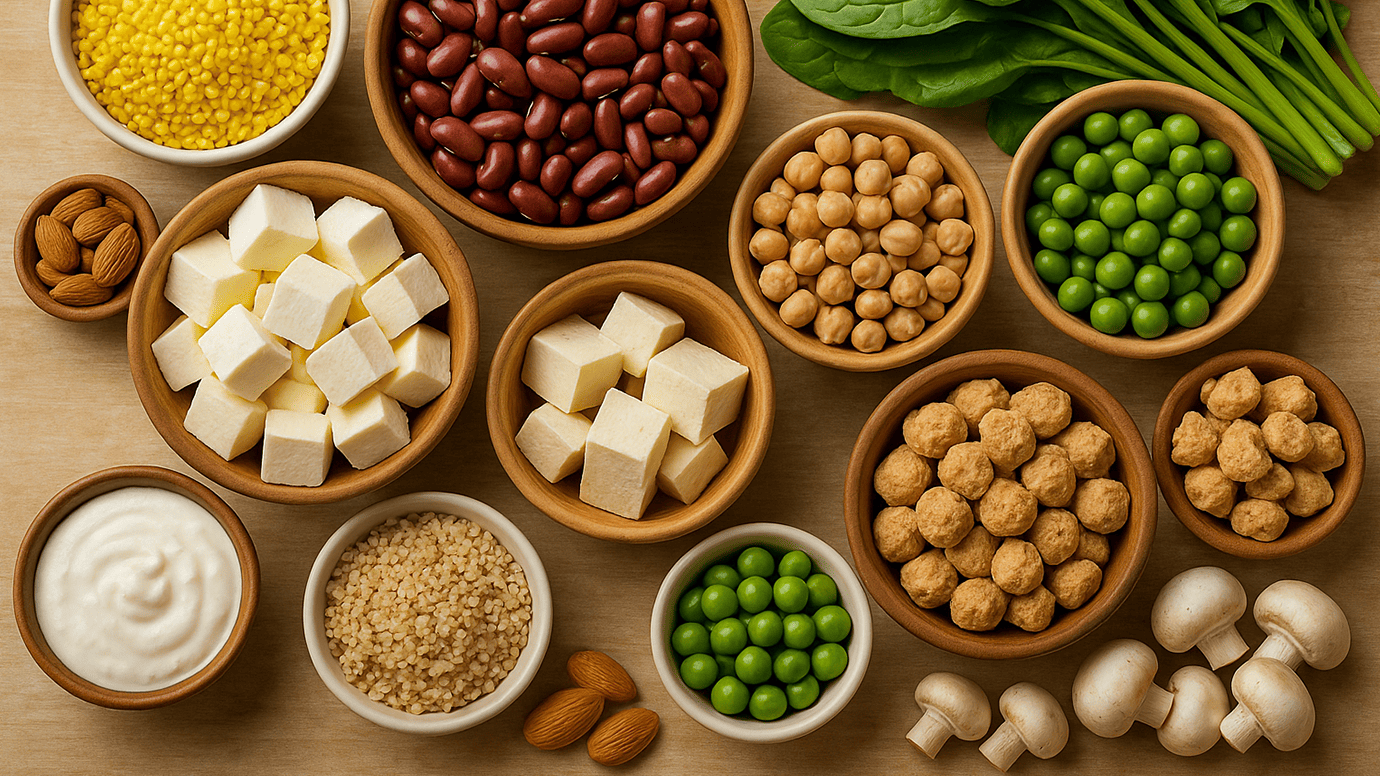
Below are the best protein foods for vegetarian diet, with serving ideas and simple ways to make them fun and kid-friendly.
Lentils and Pulses (Dal, Rajma, Chana, Moong, etc.)
Lentils and pulses are the backbone of a high protein vegetarian diet. They are packed with protein, fiber, iron, and essential vitamins — perfect for your child’s growing muscles and immune system.
Popular options:
- Moong dal, masoor dal, rajma, chana, black gram, toor dal.
- These are versatile, affordable, and blend easily into Indian meals.
Serving Ideas:
- Moong dal chilla with chutney for breakfast.
- Rajma rice for lunch — a delicious comfort meal.
- Chana cutlets or hummus as evening snacks.
Pro Tip: Combine dal or rajma with rice or whole wheat chapati to form complete proteins — a key step in building the best protein diet for vegetarians.
Dairy: Milk, Paneer, Curd, and Cheese
Dairy foods are excellent sources of protein in Indian vegetarian diet and are loved by most kids. Besides protein, they’re also rich in calcium and vitamin D — nutrients essential for bone development.
Serving Ideas:
- Paneer paratha or cheese toast for breakfast.
- Curd rice or buttermilk with lunch.
- A glass of milk or smoothie before bedtime.
Nutrient Bonus:
Dairy gives a perfect protein–calcium combo, making it an important part of any high protein vegetarian diet plan for kids.
Soy and Tofu
Soy products are among the few complete plant-based proteins, making them essential in a high protein vegetarian diet. They contain all nine essential amino acids that the body cannot produce on its own.
Options include:
Soy chunks, soy granules, tofu, soy milk, and edamame.
Serving Ideas:
- Mix soy granules into vegetable cutlets, sandwiches, or parathas.
- Stir-fry tofu with vegetables or add it to fried rice for a protein boost.
- Blend soy milk with fruits for a protein-rich smoothie.
Soy and tofu are ideal substitutes for meat, helping create the best protein diet for vegetarians without compromising taste or nutrition.
Whole Grains and Nuts
Whole grains and nuts may not seem like traditional protein sources, but they are vital for a protein rich veg diet. They offer plant-based protein, fiber, healthy fats, and micronutrients like zinc and magnesium that support muscle and brain development.
Whole Grains:
Quinoa, oats, brown rice, millets, amaranth.
Nuts & Seeds:
Almonds, peanuts, walnuts, chia seeds, flaxseeds.
Serving Ideas:
- Make oats porridge or quinoa upma for breakfast.
- Add powdered almonds or peanuts to milk or laddoos for toddlers.
- Use seeds as toppings on curd, smoothies, or fruit bowls.
Including these foods regularly enhances the nutrient diversity of a high protein vegetarian diet plan.
Vegetables with Hidden Protein
While vegetables aren’t the richest protein sources, certain ones contain a surprising amount of it. Including them boosts the overall quality of protein foods for vegetarian diet and adds vitamins, antioxidants, and fiber.
Top Options:
Green peas, spinach, broccoli, sweet corn, and mushrooms.
Serving Ideas:
- Add peas and broccoli to pulao or pasta.
- Mix spinach puree into parathas or thepla dough.
- Prepare vegetable soups blended with lentils for extra protein.
These colorful veggies make meals fun while enriching a child’s high protein vegetarian diet.
Smart Indian Food Combinations
One of the best things about Indian cuisine is how it naturally creates complete proteins through smart pairings. Combining grains and pulses or dairy and cereals helps the body get all essential amino acids.
Smart Combos:
- Dal + Rice – the classic Indian complete protein meal.
- Chapati + Curd – a balanced combo for protein and probiotics.
- Peanut chutney + Idli/Dosa – adds protein to a carb-heavy meal.
Pro Tip: Pairing cereals and pulses ensures your child gets all 9 essential amino acids, making your home-cooked meals part of the best protein diet for vegetarians.
Feeding kids a protein rich veg diet doesn’t have to be complicated. India’s traditional foods already offer everything needed for a balanced high protein vegetarian diet plan — it’s all about smart selection and creative cooking. By including these high protein foods in vegetarian diet, parents can ensure their children grow strong, energetic, and healthy — the natural, vegetarian way.
7-Day Sample Protein Rich Veg Diet Plan for Kids
Creating a balanced protein rich veg diet plan for kids doesn’t have to be complicated — it just needs thoughtful planning. With a mix of pulses, dairy, soy, nuts, and whole grains, you can design tasty meals that meet your child’s daily protein needs while keeping them excited about food.
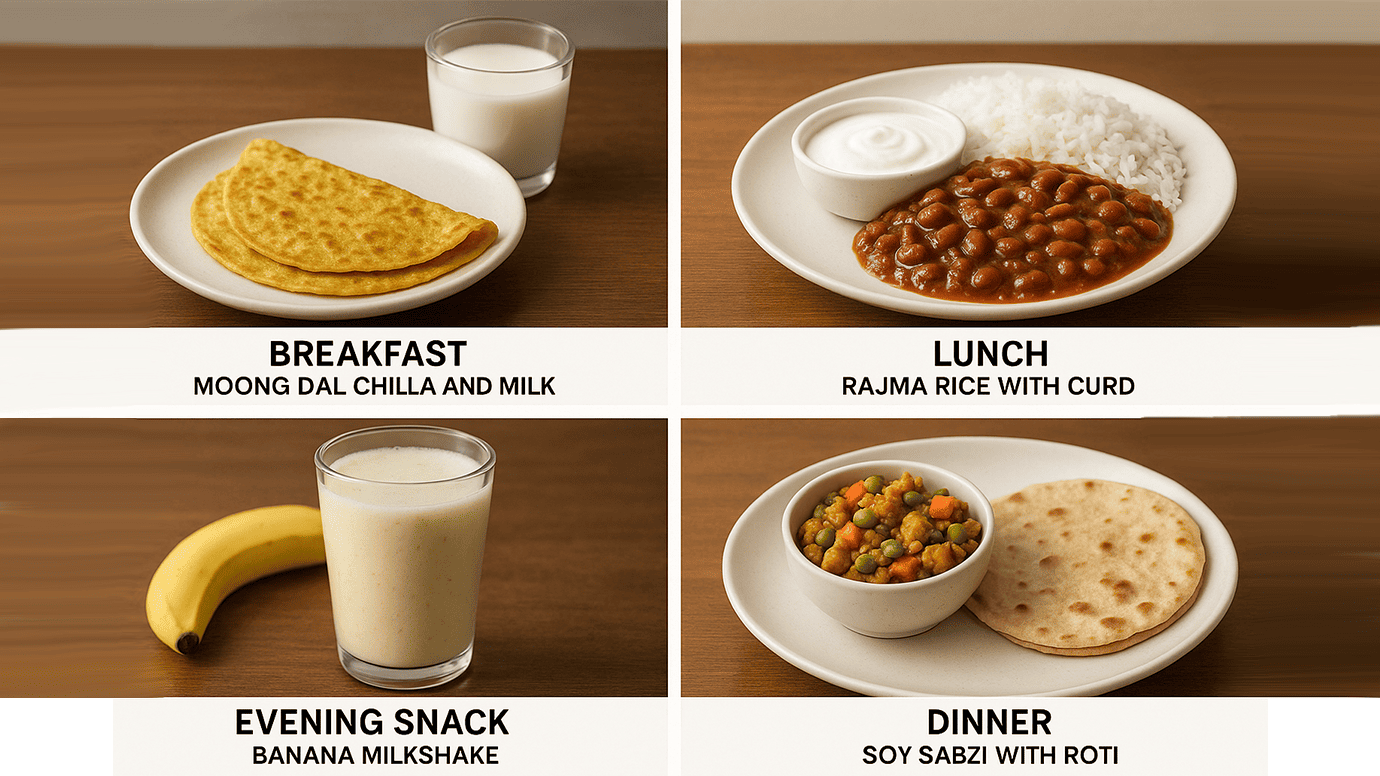
Here’s a 7-day protein rich veg diet plan that includes simple Indian meals your child will love. These dishes use familiar sources of protein like dal, paneer, tofu, curd, and nuts — all easily available in most homes.
Day | Breakfast | Lunch | Snack | Dinner |
Mon | Moong dal chilla + milk | Rajma rice + curd | Paneer cubes with pepper | Veg khichdi + soya sabzi |
Tue | Oats porridge with nuts | Dal paratha + mixed veggies | Banana milkshake | Dosa + sambar |
Wed | Besan cheela + fruit | Tofu stir-fry + whole wheat roti | Fruit smoothie | Moong dal + jeera rice |
Thu | Paneer sandwich | Chole + brown rice | Curd with seeds | Vegetable pulao + dal |
Fri | Poha with peanuts | Veg biryani + raita | Roasted chana | Palak paneer + chapati |
Sat | Idli + peanut chutney | Khichdi + curd | Soy cutlets | Vegetable curry + rice |
Sun | Upma with veggies | Quinoa pulao + curd | Almond milk | Dal soup + paratha |
Quick Recipes & Swap Ideas for Fussy Eaters
Moong Dal Chilla:
Blend soaked moong dal with a bit of ginger, salt, and cumin. Cook like a pancake. For variety, add grated carrots or paneer stuffing.
Rajma Rice:
Rich in protein and fiber, a comforting lunch option. If your child dislikes rajma, try chana masala or masoor dal instead.
Tofu Stir-Fry:
Toss tofu cubes with colorful veggies and mild spices. For kids who prefer Indian flavors, replace tofu with paneer.
Banana Milkshake or Smoothie:
Blend banana, milk, and a spoon of peanut butter or almonds for an easy high protein foods in vegetarian diet drink.
Soya Sabzi or Cutlets:
Great protein foods for vegetarian diet, soy chunks can be added to pulao, parathas, or turned into crispy cutlets for snacks.
Pro Tips for Parents
Variety is key:
Rotate between lentils, paneer, tofu, and nuts to keep meals exciting and nutrient-rich.
Complete proteins:
Pair cereals with pulses (like dal and rice) to ensure your child gets all essential amino acids — a must for a high protein vegetarian diet.
Sneak in nutrition:
Add spinach puree to dosas, grated carrots in parathas, or nut powder in milk to enhance protein intake effortlessly.
Hydration matters:
Encourage kids to drink milk, buttermilk, or smoothies instead of sugary drinks — these are rich sources of protein in Indian vegetarian diet.
This sample of 7-day protein rich veg diet plan is a practical guide for parents who want to provide the best protein diet for vegetarians without making drastic changes to their family’s eating habits. By including simple, home-cooked meals made from high protein foods in vegetarian diet, you can create a well-balanced, sustainable routine that supports your child’s growth, immunity, and energy levels.
Common Mistakes to Avoid while giving Protein rich veg diet to Kids
Even the most well-intentioned parents can make nutritional errors when planning a protein rich veg diet for their children. While vegetarian diets can provide all essential nutrients, small missteps often reduce the protein quality and overall balance of meals. Here are some common mistakes to watch out for when following a high protein vegetarian diet plan for kids:
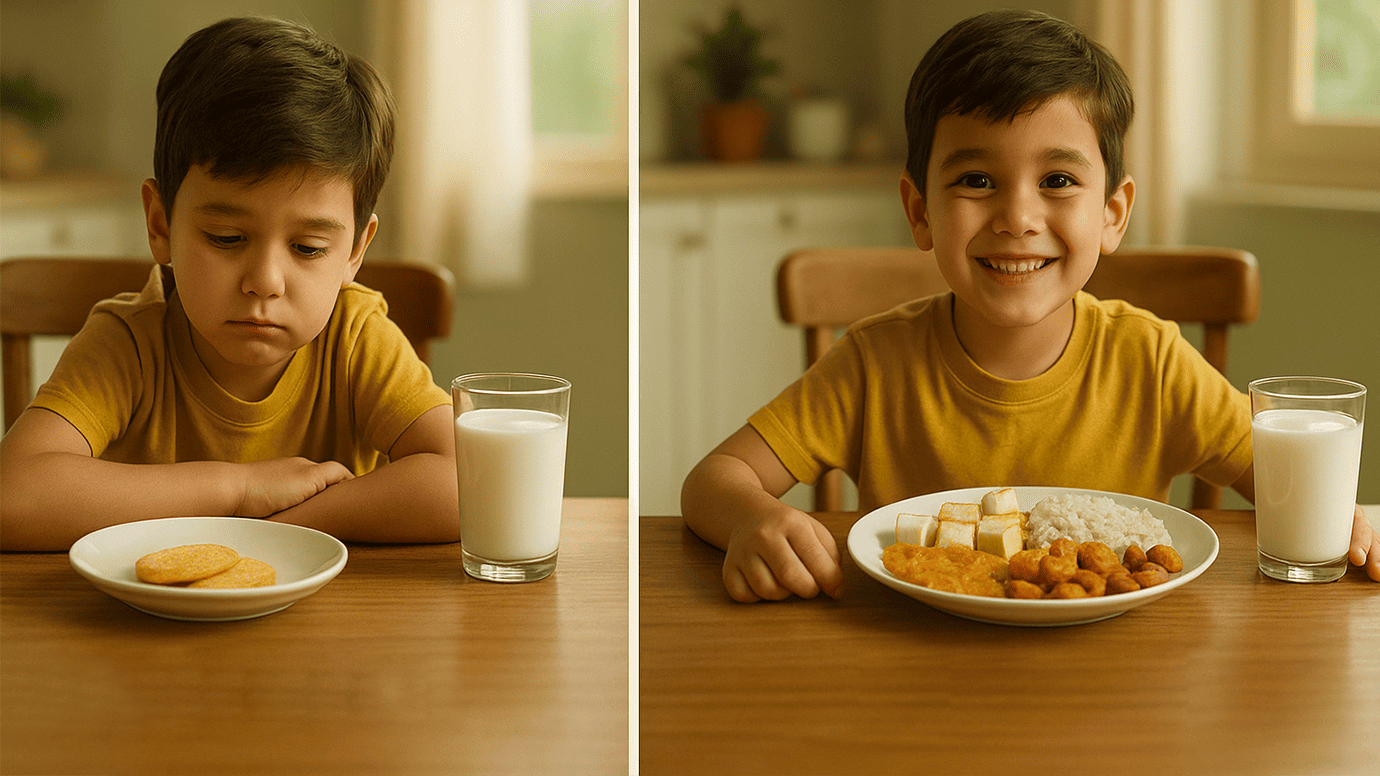
Relying Too Much on Milk:
Many parents assume milk alone is enough to meet daily protein needs. While it’s a valuable food, depending solely on it can lead to nutrient gaps. Milk should be combined with other sources of protein in Indian vegetarian diet such as lentils, paneer, tofu, and nuts for complete nourishment.
Not Pairing Foods Correctly:
Most plant-based foods are incomplete proteins. Failing to pair cereals with pulses — like rice with dal or chapati with curd — prevents children from getting all essential amino acids. Smart food pairing is crucial for building a high protein vegetarian diet that supports healthy growth.
Overusing Packaged Protein Foods:
Relying on protein biscuits or powders can do more harm than good. These processed options often contain added sugar and preservatives. Instead, focus on high protein foods in vegetarian diet such as lentils, beans, and seeds — natural, wholesome, and safe.
Skipping Meals or Snacking on Carbs:
Skipping breakfast or relying on carb-heavy snacks like chips and biscuits reduces protein intake. To maintain energy and concentration, include protein foods for vegetarian diet like sprouts, roasted chana, or nuts in between meals.
Avoiding these simple mistakes ensures your child gets the full benefit of a balanced, natural, and nutritious best protein diet for vegetarians — helping them stay active, strong, and healthy every day.
Tips to Make Protein Rich Veg Diet Fun and Kid-Friendly
Encouraging kids to eat healthy doesn’t have to be a struggle — it can actually be fun! Making a protein rich veg diet appealing to children is all about creativity, variety, and presentation. The more colorful and engaging the meal looks, the more likely your child is to enjoy it.
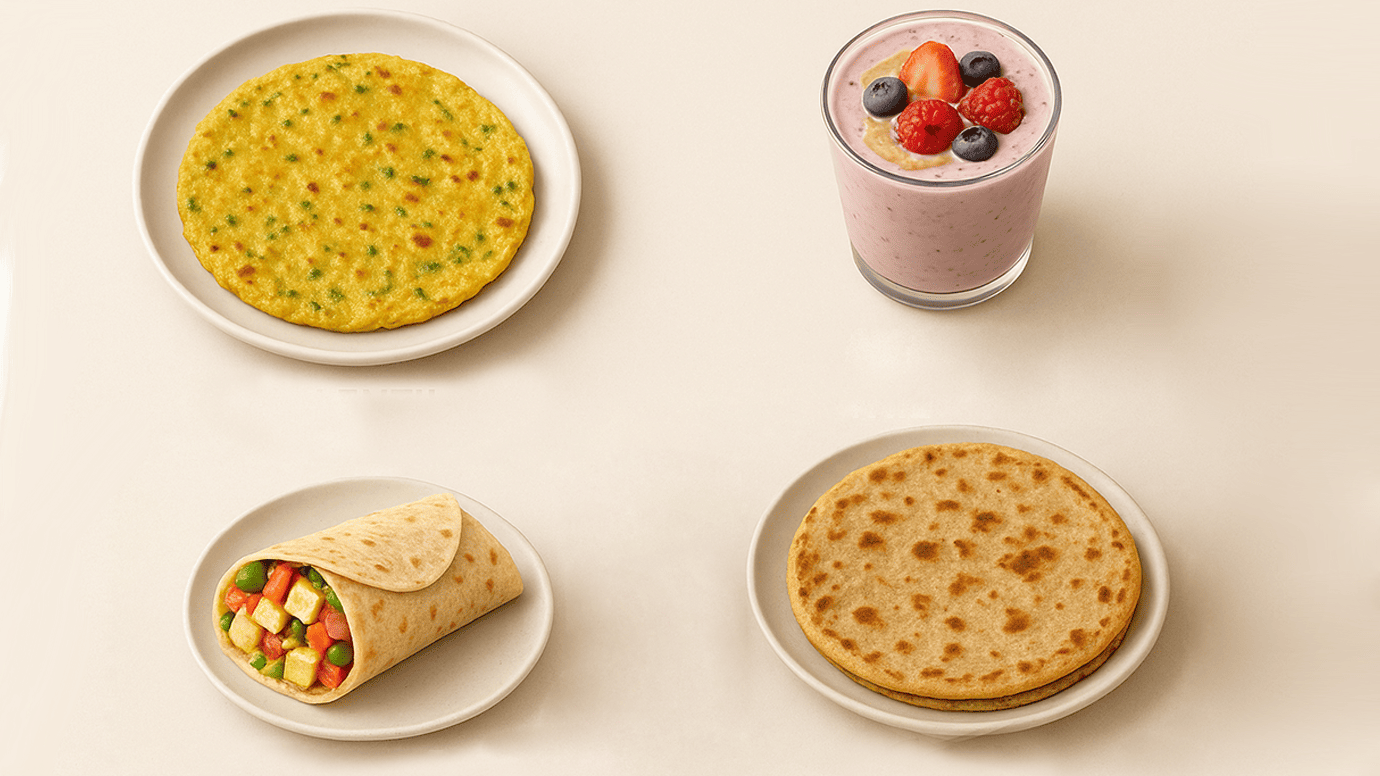
Play with Presentation:
Transform regular meals into exciting shapes — like animal pancakes, smiley parathas, or rainbow salad bowls. This not only makes mealtime fun but also encourages children to try new high protein foods in vegetarian diet without resistance.
Sneak in Proteins Smartly:
Add a protein boost to your child’s favorite dishes! Try lentil pancakes, nut butter smoothies, paneer wraps, or stuffed soy parathas. These delicious and easy options naturally increase protein foods for vegetarian diet intake while satisfying picky eaters.
Involve Kids in Cooking:
Children are more likely to eat what they help prepare. Let them roll out paneer wraps or top their curd bowls with nuts and seeds — both excellent sources of protein in Indian vegetarian diet.
If you’re wondering how to increase protein in child diet, focus on small, consistent changes. Over time, these habits form the foundation of a sustainable high protein vegetarian diet plan — making every meal both nutritious and enjoyable.
FAQs
Q1. What is a good way to start a protein rich veg diet for kids?
- A. A great way to begin a protein rich veg diet for children is by including a variety of pulses, lentils, paneer, tofu, soy, nuts, and seeds in daily meals. Combining different sources of protein in Indian vegetarian diet like dal with rice or roti with curd helps create balanced, complete proteins essential for healthy growth.
Q2. Which are the best high protein foods in vegetarian diet for growing children?
- A. Some of the high protein foods in vegetarian diet include lentils (moong, masoor, chana), paneer, curd, tofu, soy chunks, almonds, peanuts, and quinoa. These are excellent protein foods for vegetarian diet and can be easily adapted into Indian-style meals kids enjoy.
Q3. How much protein does a child need every day?
- A. Protein requirements depend on a child’s age, weight, and activity level. On average, toddlers need around 13 grams per day, young children 19 grams, and pre-teens about 34 grams. A well-balanced high protein vegetarian diet plan ensures your child gets enough protein for muscle development and overall growth.
Q4. Can a vegetarian diet provide complete protein for kids?
- A. Yes, absolutely. When planned well, a high protein vegetarian diet can provide all essential amino acids. Pairing foods such as dal with rice, chapati with curd, or peanut chutney with idli ensures complete protein intake in a protein rich veg diet.
Q5. Are dairy products good sources of protein for vegetarian kids?
- A. Yes, dairy is one of the best sources of protein in Indian vegetarian diet. Foods like milk, paneer, cheese, and curd provide both protein and calcium, making them ideal for bone and muscle development. They are a core part of the best protein diet for vegetarians.
Q6. What are some easy ways to increase protein in a child’s daily meals?
- A. To boost protein intake, try adding lentil pancakes, paneer wraps, soy cutlets, or nut butter smoothies. Small additions of high protein foods in vegetarian diet can make a big difference. These fun and tasty dishes make it easy to maintain a protein rich veg diet even for picky eaters.
Q7. What mistakes should parents avoid in a vegetarian protein diet for kids?
- A. Common mistakes include relying too much on milk, skipping meals, or not pairing foods to form complete proteins. Avoid packaged protein snacks and instead focus on fresh high protein foods in vegetarian diet like lentils, nuts, and seeds to ensure balanced nutrition.
Q8. How can I make high-protein vegetarian meals fun for kids?
- A. Creativity is key! Try colorful food plating, make paneer or lentil wraps, and blend nuts or seeds into milkshakes. This not only adds variety to a protein rich veg diet but also helps children develop positive eating habits while following a high protein vegetarian diet.
Conclusion
Raising healthy, active, and happy kids begins with providing them the right nutrition — and protein plays a key role in that journey. A thoughtfully balanced protein rich veg diet is not just possible in a vegetarian household, but it can also be delicious, diverse, and easy to follow. With the right mix of high protein foods in vegetarian diet such as lentils, paneer, soy, tofu, nuts, and dairy, parents can ensure their children receive all the essential amino acids necessary for growth, muscle strength, and strong immunity.
The beauty of Indian cuisine is its abundance of sources of protein in Indian vegetarian diet. From rajma-chawal and dal-paratha to curd with seeds or peanut chutney with idli, simple home-cooked meals can form the foundation of a perfectly balanced high protein vegetarian diet for children. The secret lies in variety, smart combinations, and consistency.
By avoiding common mistakes, introducing fun, kid-friendly meal ideas, and planning ahead, parents can easily implement the best protein diet for vegetarians that supports both taste and health. A structured high protein vegetarian diet plan not only helps kids grow stronger physically but also builds lifelong healthy eating habits rooted in natural, plant-based nutrition.
Every child is unique — and their nutritional needs are too. Personalized guidance helps transform daily meals into powerful tools for growth and well-being.
Curious to see how a personalized meal plan can transform your family’s health? Visit our Homepage to learn how our experts can help you make smart food choices that fit your goals, routine, and lifestyle.
Disclaimer:
This blog is for informational purposes only and is not a substitute for professional medical or dietary advice. While a protein rich veg diet and a balanced high protein vegetarian diet plan can support healthy growth in children, every child’s nutritional needs are unique. Please consult a qualified pediatrician or dietitian before making significant changes to your child’s protein foods for vegetarian diet or overall meal plan.